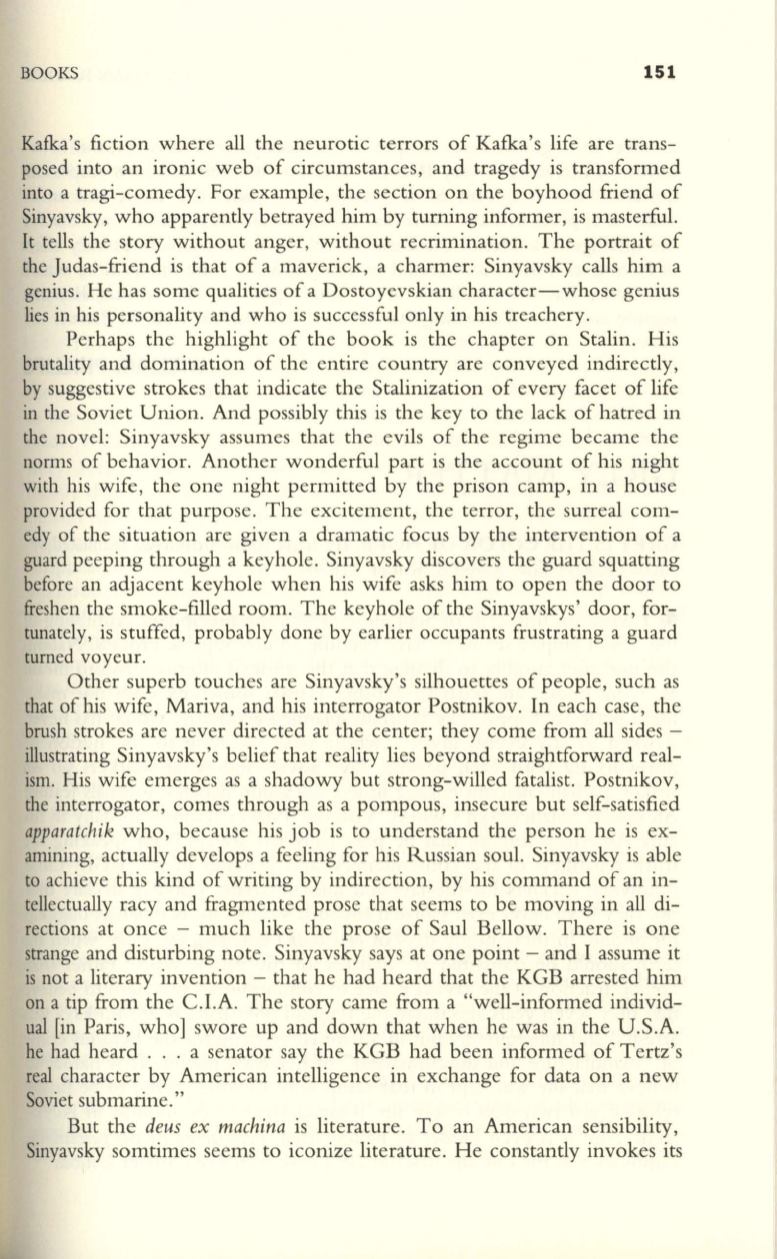
BOOKS
151
Kafka's fiction where all the neurotic terrors of Kafka's life are trans–
posed into an ironic web of circumstances, and tragedy is transformed
into a tragi-comedy. For example, the section on the boyhood friend of
Sinyavsky, who apparently betrayed him by turning informer, is masterful.
It tells the story without anger, without recrimination. The portrait of
the Judas-friend is that of a maverick, a charmer: Sinyavsky calls him a
genius. He has some qualities of a Dostoyevskian character-whose genius
lies in his personality and who is successful only in his treachery.
Perhaps the highlight of the book is the chapter on Stalin. His
brutality and domination of the entire country are conveyed indirectly,
by suggestive strokes that indicate the Stalinization of every facet of life
in the Soviet Union. And possibly this is the key to the lack of hatred in
the novel: Sinyavsky assumes that the evils of the regime became the
norms of behavior. Another wonderful part is the account of his night
with his wife, the one night permitted by the prison camp, in a house
provided for that purpose. The excitement, the terror, the surreal com–
edy of the situation are given a dramatic focus by the intervention of a
guard peeping through a keyhole. Sinyavsky discovers the guard squatting
before an adjacent keyhole when his wife asks him to open the door to
freshen the smoke-filled room. The keyhole of the Sinyavskys' door, for–
tunately, is stuffed, probably done by earlier occupants frustrating a guard
turned voyeur.
Other superb touches are Sinyavsky's silhouettes of people, such as
that of his wife, Mariva, and his interrogator Postnikov. In each case, the
brush strokes are never directed at the center; they come from all sides -
illustrating Sinyavsky's belief that reality lies beyond straightforward real–
ism. His wife emerges as a shadowy but strong-willed fatalist. Postnikov,
the interrogator, comes through as a pompous, insecure but self-satisfied
apparatchik
who, because his job is to understand the person he is ex–
amining, actually develops a feeling for his Russian soul. Sinyavsky is able
to achieve this kind of writing by indirection, by his command of an in–
tellectually racy and fragmented prose that seems to be moving in all di–
rections at once - much like the prose of Saul Bellow. There is one
strange and disturbing note. Sinyavsky says at one point - and I assume it
is not a literary invention - that he had heard that the KGB arrested him
on a tip from the C.I.A. The story came from a "well-informed individ–
ual [in Paris, who] swore up and down that when he was in the U.S.A.
he had heard ... a senator say the KGB had been informed of Tertz's
real character by American intelligence in exchange for data on a new
Soviet submarine."
But the
deus ex machina
is literature . To an American sensibility,
Sinyavsky somtimes seems to iconize literature. He constantly invokes its


